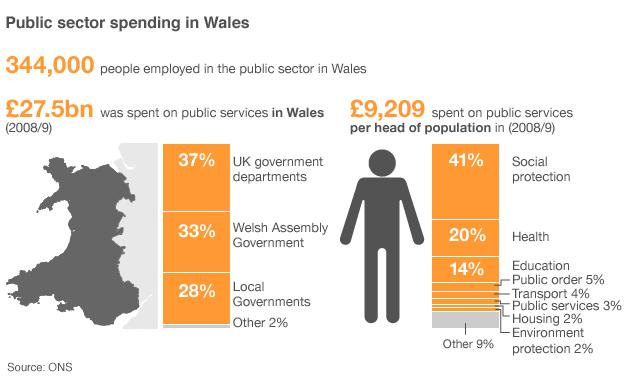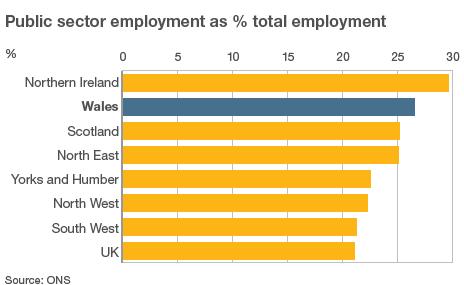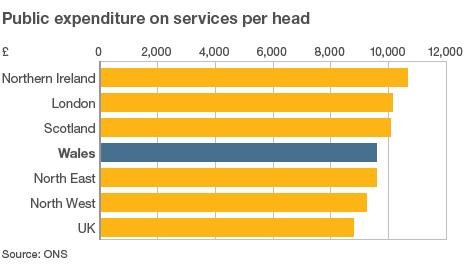Wales 'more vulnerable to public spending cuts'
- Published

Wales could be more vulnerable to spending cuts than other parts of the UK because of the high proportion of people employed in the public sector, figures suggest.
Official statistics show that 344,000 people in Wales work in the public sector, or some 27.5% of all employees.
Steve Thomas, of the Welsh Local Government Association, said parts of Wales could be "decimated" by cuts.
A spending review will be announced by the UK coalition government next month.
Ministers are seeking to cut a national debt expected to reach £900bn in the next few years.
New figures from the Office for National Statistics (ONS) for the first quarter of 2010 show 27.5% of the working population in Wales is employed by the public sector, compared to the UK average of 21.2%.
The figures released on Monday show the number of public sector workers in Wales remained unchanged at 344,000 over the year from January 2009.
But the statistics also show that private sector employment fell in Wales by more than five percent, or 52,000 over the same period.
For the first an ONS breakdown of the Welsh figures show 138,000 were in central government, 182,000 in local government and 24,000 were in public corporations.

The industrial breakdown shows that 92,000 were employed in the NHS, 81,000 in education and 76,000 in public administration.
Spending on public services per head of the population in Wales is also among the highest of any part of the UK.
"The public sector is the default employer in Wales," said Steve Thomas, chief executive of the Welsh Local Government Association (WLGA).
He added: "We are in the situation, especially with the running down of heavy industry, and the end of inward investment, that the public sector in Wales actually does the job of the private sector in England - particularly in terms of economic development."
The WLGA has already warned that thousands of jobs could go in local government - from schools to emergency services.
According to the Centre for Economics and Business Research (CEBR), the unemployment rate will exceed 10% in Wales as a result of predicted huge cuts to public sector jobs.
That could put even more pressure on public services in Wales, where £4 out of every £10 of public money is spent on social protection, which includes unemployment benefit.
Mr Thomas said local authorities were awaiting the news of the Comprehensive Spending Review with "trepidation".

He said local government in Wales was bracing itself for a fall in revenue of around £140m each year and capital funding by £50m a year.
"If we are hit with the level of cuts that are being modelled, between 25% and 40%... it could decimate large parts of communities in Wales," said Mr Thomas.
Officials who had gone through the spending cuts of the 1980s had described the current climate as the worst they had known, he said.
"The bottom line is that people have got to realise that things are not going to stay the same.
"They will see more school closures, they will see a reduction in local services," he said.
Robin Morrison, chief executive of Blaenau Gwent council, said cuts to services were inevitable, and the picture was the same across all Wales' authorities.
"We are going to try and do everything we can to protect front line services," he said, adding that the authority was already looking at efficiency savings.
"There will be a downsizing of the workforce.. but we're trying to avoid compulsory redundancies as much as we can," he added.
More than £27.5bn was spent on public services in Wales in 2008/9, a third of that coming from the Welsh Assembly Government.
The assembly government has already announced it is making cuts of 1% in its budget for 2010/11 and is planning for cuts up to 3% to revenue and 10% to capital for the years ahead.
"You would be naive to suggest that Wales is not more vulnerable [than other parts of the UK] because public spending is higher as a proportion of our economy," said David Rosser, director of the CBI in Wales.
Mr Rosser said that while public sector cuts could mean opportunities for the private sector it would be wrong for any one in business to speak with a note of triumphalism.
Seismic shift
"The private sector has an opportunity to demonstrate its worth because hopefully we will see closer interaction between the public and private sector."
But he warned there would need to be a seismic shift in how people viewed the role of the private sector in public services.
"For many politicians in Wales the spending review is about what it means to public sector jobs and how to preserve those jobs and not how to deliver public services."
He said the spending review could lead to a "sharper Wales, with more focus on value and how public money is spent".
"Hopefully it will lead to a Wales where the role of the private sector is more greatly valued by some in the public sector," he added.
Lynn Hine, of accountants PriceWaterhouseCoopers, said a debate was needed about the role and size of the public sector in Wales.
"For Wales there is the potential for the country to be affected in a very different way, not least because almost a quarter of the workforce is employed in the public sector.
"We have seen smaller countries build agreement for change between the private sector, the public sector and the voluntary sector. And there is a real opportunity to do something in a different way in Wales.
"But certainly difficult decisions will need to be taken in order to cut the cloth to fit the new budget."